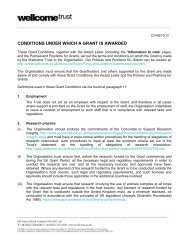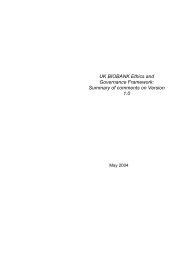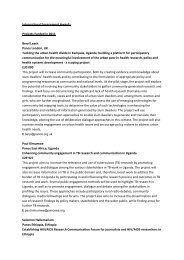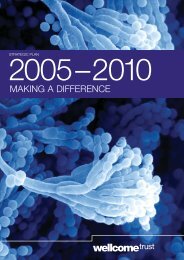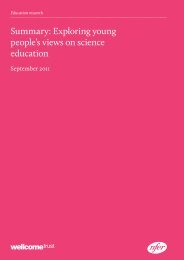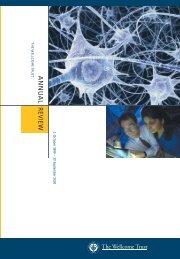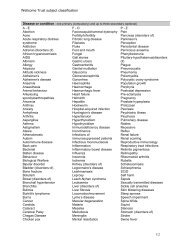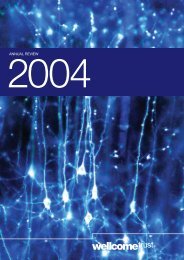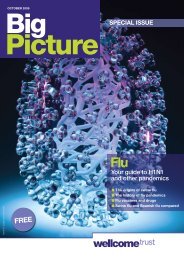Create successful ePaper yourself
Turn your PDF publications into a flip-book with our unique Google optimized e-Paper software.
38 | FACILITATING RESEARCH<br />
Clinical approach<br />
Hybrid vigour<br />
A clinical trial facility in Kenya has hosted<br />
groundbreaking work on a malaria vaccine.<br />
Accurate information helped to<br />
ensure a mature debate about<br />
mixed-species embryos.<br />
1<br />
One of the factors holding back<br />
medical research in Africa is a dearth<br />
of centres and staff able to carry out<br />
clinical trials. A facility established at<br />
the KEMRI–<strong>Wellcome</strong> <strong>Trust</strong> Research<br />
Programme at Kilifi, Kenya, has not<br />
only hosted a highly successful<br />
clinical trial of the world’s leading<br />
malaria vaccine but is also providing<br />
a base to test locally important<br />
interventions and develop a skilled<br />
local workforce.<br />
Malaria kills around a million people a<br />
year, most of them young children in<br />
sub-Saharan Africa. Progress towards<br />
an effective vaccine has been painfully<br />
slow, but there are encouraging signs<br />
that some have a significant (albeit not<br />
complete) protective effect.<br />
Of these, the RTS,S vaccine developed<br />
by GlaxoSmithKline is the most<br />
promising, typically achieving protection<br />
rates of about 30 per cent. Even more<br />
positively, a phase II trial, organised by<br />
the Malaria Vaccine Initiative and run in<br />
Kilifi and a second site in Tanzania,<br />
upped this figure to 53 per cent, thanks<br />
to a new immune-boosting adjuvant.<br />
These exciting findings have justified a<br />
much larger phase III trial involving<br />
15 000 children across several sites in<br />
Africa, including Kilifi and the <strong>Trust</strong>funded<br />
facilities in Malawi.<br />
The Kilifi facility occupies a building<br />
funded by the <strong>Trust</strong> and the Malaria<br />
Clinical Trials Alliance, and complements<br />
the main laboratory and administrative<br />
block funded by the <strong>Trust</strong>. Kilifi now has<br />
all the facilities needed to run major<br />
international trials, and has trained local<br />
staff to design and run their own studies<br />
to equally high standards. Moreover, by<br />
concentrating the physical infrastructure<br />
and specialist support staff, the facility<br />
can offer a high-quality environment for<br />
all kinds of intervention – vaccine, drug<br />
trials or other clinical studies.<br />
Thus, as well as globally important trials,<br />
the facility also hosts studies addressing<br />
local public health questions. For<br />
example, Jay Berkley has begun a<br />
<strong>Trust</strong>-funded trial of prophylactic<br />
antibiotic use in malnourished children.<br />
After being discharged from hospital,<br />
such children often die when they return<br />
home. Dr Berkley is testing whether a<br />
year’s use of antibiotics after discharge<br />
can protect vulnerable children during<br />
this critical period.<br />
Bejon P et al. Efficacy of RTS,S/AS01E: clinical malaria<br />
in 5 to 17 month old children. N Engl J Med<br />
2008;359:2512–32.<br />
Abdulla S et al. Safety and immunogenicity of RTS,<br />
S/AS02D malaria vaccine in infants. N Engl J Med<br />
2008;359:2533–44.<br />
The Malaria Vaccine Initiative is funded by the<br />
Bill and Melinda Gates Foundation and operated<br />
by the not-for-profit organisation PATH.<br />
In 2007, the Government introduced<br />
draft legislation to update the 1990<br />
Human Fertilisation and Embryology<br />
Act. Perhaps the most contentious<br />
change was a provision to allow the<br />
creation of human–animal hybrid<br />
embryos – seen by scientists as vital<br />
in embryonic stem cell research but<br />
of ethical concern to some groups. To<br />
encourage informed discussion about<br />
a potentially highly emotive subject,<br />
the <strong>Wellcome</strong> <strong>Trust</strong> organised a range<br />
of briefings and other activities to<br />
communicate the scientific, medical<br />
and ethical context of the new Act.<br />
The UK has a well-established regulatory<br />
framework for research on human<br />
embryos, rooted in the 1990 Human<br />
Fertilisation and Embryology Act. The<br />
new legislation was designed to take<br />
account of the rapid pace of change<br />
since 1990, including the use of human–<br />
animal hybrid embryos, a potential<br />
source of human embryonic stem cells.<br />
Although of great medical potential,<br />
research on such cells is held back by a<br />
lack of human material. To overcome this<br />
difficulty, human DNA can be inserted<br />
into non-human eggs and early-stage<br />
embryos grown to the point at which<br />
embryonic stem cells can be isolated.<br />
To promote a reasoned debate, the <strong>Trust</strong><br />
developed briefing material on the key<br />
issues for members of the House of<br />
Images<br />
1 Staff at the Clinical Trial Facility in Kilifi.<br />
2 An early human embryo.



